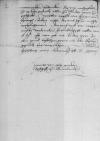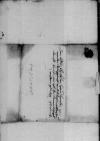Wir haben gestern(n) E(wer) H(erlichkei)t ⌊⌋ dy meynung der zceyse halben. / Wywol ⌊ko(niglich)e m(ajeste)t⌋ durch ir schreyben genediglich zugelassenn(n), / das zu ⌊Thorn⌋ das gefallen geldt dem ⌊lande⌋ zu gut gehalthen(n) sold werdenn, / so hatt doch der, / des bryff h written over b⌈bhh written over b⌉y bey leydt, / durch dy leyment ko(nigliche)n wyllen(n) zu ⌊Pugken⌋ geslossenn(n), / und uff uns allenn(n) unlust gelegt, / derwegen uns hefftige schryffte sein zukomen(n). / Dyweyl wir dan sehen, das sich ins gemein dyser sweren(n) bedruckung nymandt annimpt, / und dy hern neben den steten / uff das yre alleynne achtung habenn(n), / und uff uns alles lassen bleyben, / nicht angesehen, wasz ir schreyben an ⌊ko(niglich)e m(ajeste)t⌋ ausz vorgangner adscribed⌈rr adscribed⌉ ⌊thagfart⌋, negst vor eynnem(m) jare zu ⌊Grawdentz⌋ gehalthen, / in heldt, / das wyr himit eynne copey eingelegt, / so mussen wir thun, / was wyder yren vorigen wyllen(n) ko(niglich)e m(ajeste)t hat gebothen, / und mit den ersten, was bey uns gefallen, gen ⌊Marienburg⌋ ubersendenn(n), / wy wir dan auch solchs dem hochwirdigen ⌊hern von Colmheshe⌋ ⌊⌋, / der uns hiruff des g(nedigs)t(e)n hern ⌊marienburgischn  APG 300, 53, 267 p. 22 woyewoden(n)⌋ bedencken, / das uns wolgefallen(n), so es der gestaldt allen zu mutte were, / zu geschickt. / Weytter wysse wir hirynnen(n), / dyweyl andre nichts darumb thun, / nichts vortzunhemen(n). / Darumb, und von wegen(n) unser vortrawten(n) freuntlicheytt, wolte wir E(wer) H(erlichkei)t, dy wir Got mit al den yren in sein gnad befelhen, / gerne mit den ersten(n) gesundt bey uns sehen. /
APG 300, 53, 267 p. 22 woyewoden(n)⌋ bedencken, / das uns wolgefallen(n), so es der gestaldt allen zu mutte were, / zu geschickt. / Weytter wysse wir hirynnen(n), / dyweyl andre nichts darumb thun, / nichts vortzunhemen(n). / Darumb, und von wegen(n) unser vortrawten(n) freuntlicheytt, wolte wir E(wer) H(erlichkei)t, dy wir Got mit al den yren in sein gnad befelhen, / gerne mit den ersten(n) gesundt bey uns sehen. /
 APG 300, 53, 267 p. 22 woyewoden(n)
APG 300, 53, 267 p. 22 woyewoden(n)

